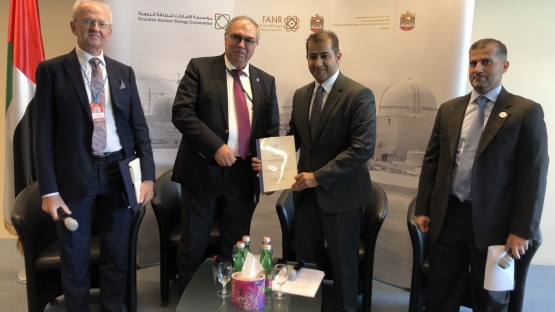IAEA Delivers Report on Nuclear Power Infrastructure Development to United Arab Emirates
Ambassador Hamad Alkaabi, Permanent Representative of the
UAE to the IAEA, receives the INIR Mission report from Mikhail Chudakov,
IAEA Deputy Director General and Head of the Department of Nuclear
Energy, at an event held at the IAEA, 18 September 2018. (Photo:
A.Evrensel/IAEA)
The IAEA delivered the final report of a mission that reviewed
the United Arab Emirates' infrastructure development for a nuclear power
programme.
The Integrated Nuclear Infrastructure Review (INIR) mission to the UAE took place from 24 June to 1 July 2018 at the invitation of the Government. This INIR mission was the first the IAEA has conducted for a country in the final, third phase of the IAEA’s Milestones Approach, which provides detailed guidance for developing the infrastructure needed for a nuclear power programme. It was the second INIR mission to the UAE, following a phase 2 mission in 2011.
Mikhail Chudakov, IAEA Deputy Director General and Head of the Department of Nuclear Energy, handed the report to Ambassador Hamad Alkaabi, the UAE’s Permanent Representative to the IAEA, during an event held at the sidelines of the 62nd IAEA General Conference today.
“Our partnership with the Agency has been very strong in the past ten years,” said Ambassador Alkaabi. “We have concluded ten major review missions, on our regulatory system, nuclear infrastructure development, emergency preparedness and response, safeguards, physical protection and operational safety.”
These review missions and advisory services provided an independent perspective on the UAE’s development of a safe, secure and sustainable nuclear power programme.
“The last ten years were certainly challenging for the UAE and its nuclear community,” said Chudakov. “They were also challenging for the IAEA, as its programme for embarking countries was new.” Several mechanisms for integrated support to nuclear newcomer countries were developed and tested for the first time with the UAE, including the pilot INIR phase 3 mission.
“The support we provide is small, when compared with the overall cost of the UAE programme, but it is strategic,” Chudakov remarked. “We are glad to have contributed, even on a small scale, to the programme’s success.”
The mission report points out that the UAE is getting close to completing the required nuclear power infrastructure for starting the operation of its first nuclear power plant. It has established competent organizations and the legal and regulatory framework, and has plans for achieving operational readiness. The report includes several recommendations and suggestions where further action would benefit the UAE, and identifies good practices in the areas of management and human resource development, nuclear safety, safeguards and security interface.
The Integrated Nuclear Infrastructure Review (INIR) mission to the UAE took place from 24 June to 1 July 2018 at the invitation of the Government. This INIR mission was the first the IAEA has conducted for a country in the final, third phase of the IAEA’s Milestones Approach, which provides detailed guidance for developing the infrastructure needed for a nuclear power programme. It was the second INIR mission to the UAE, following a phase 2 mission in 2011.
Mikhail Chudakov, IAEA Deputy Director General and Head of the Department of Nuclear Energy, handed the report to Ambassador Hamad Alkaabi, the UAE’s Permanent Representative to the IAEA, during an event held at the sidelines of the 62nd IAEA General Conference today.
“Our partnership with the Agency has been very strong in the past ten years,” said Ambassador Alkaabi. “We have concluded ten major review missions, on our regulatory system, nuclear infrastructure development, emergency preparedness and response, safeguards, physical protection and operational safety.”
These review missions and advisory services provided an independent perspective on the UAE’s development of a safe, secure and sustainable nuclear power programme.
“The last ten years were certainly challenging for the UAE and its nuclear community,” said Chudakov. “They were also challenging for the IAEA, as its programme for embarking countries was new.” Several mechanisms for integrated support to nuclear newcomer countries were developed and tested for the first time with the UAE, including the pilot INIR phase 3 mission.
“The support we provide is small, when compared with the overall cost of the UAE programme, but it is strategic,” Chudakov remarked. “We are glad to have contributed, even on a small scale, to the programme’s success.”
The mission report points out that the UAE is getting close to completing the required nuclear power infrastructure for starting the operation of its first nuclear power plant. It has established competent organizations and the legal and regulatory framework, and has plans for achieving operational readiness. The report includes several recommendations and suggestions where further action would benefit the UAE, and identifies good practices in the areas of management and human resource development, nuclear safety, safeguards and security interface.
About INIR Missions
Integrated
Nuclear Infrastructure Review missions enable IAEA Member State
representatives to have in-depth discussions with IAEA and international
experts about conditions and best international practices in the
development of a nuclear power programme. In developing its
recommendations, the INIR team considers the comments made by the
relevant national organizations. Implementation of any of the team's
recommendations is at the discretion of the Member State requesting the
mission. The results of the INIR mission are expected to assist the
Member State to develop an action plan to fill any gaps, which in turn
will help the development of the national nuclear power infrastructure.
The IAEA publishes the INIR mission report on its website 90 days after
its delivery to the Member State, unless the State requests in writing
that the IAEA not do so.


No comments:
Post a Comment